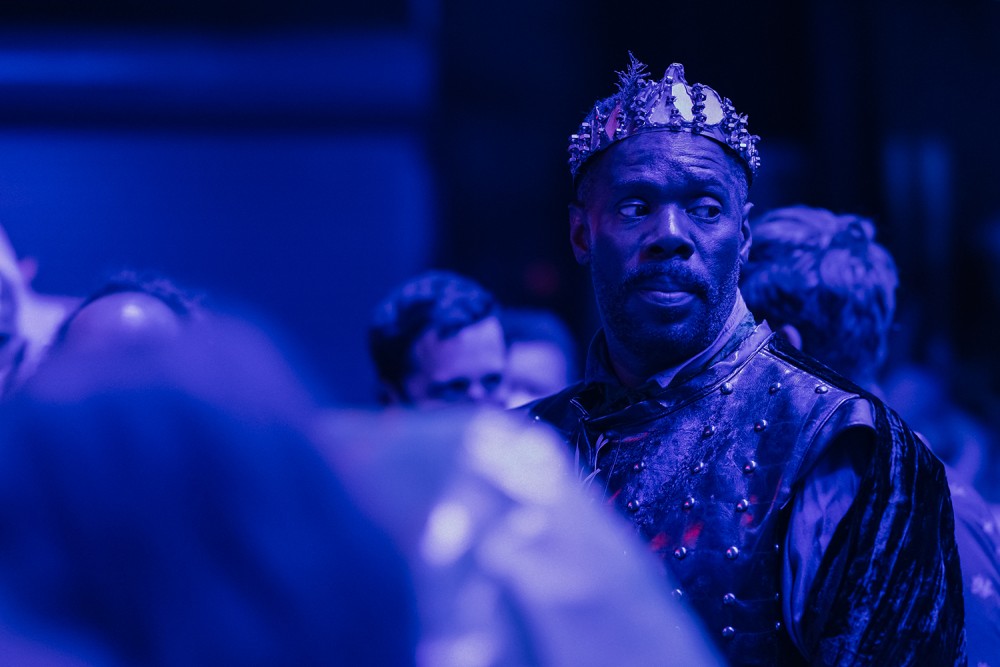What the theater can do
It’s hard to talk about the transformative power of being onstage without sounding ridiculous. Sing Sing and Ghostlight show us instead.

About halfway through Sing Sing (directed by Greg Kwedar), a group of actors is asked to perform a scene for a group of potential donors in the hopes of buying new stage curtains. They pump each other up backstage and emerge energized from the wings. Sitting in front of them is a small row of tight-lipped, wealthy, White women. The actors look at each warily for a split second before launching into a melee of theatrical combat from Spartacus.
Anyone involved in a struggling community enterprise will understand the stakes of this kind of performance: they need to convince these donors that the arts are meaningful enough to open their pocketbooks. In this case, though, the actors are all incarcerated at Sing Sing, a maximum-security prison in New York state. Their community theater is a rehabilitation program, and they are performing their humanity as much as their artistic capabilities.
Read our latest issue or browse back issues.
After the performance, the actors wait to hear how it went, ruefully laughing at the shocked horror they imagine the women felt when they saw a group of incarcerated Black and Brown men launch themselves at each other in unconstrained theatrical violence. “I can’t believe you chose that scene,” the superintendent of the prison says, shaking his head as he reappears. “But they loved it,” he concedes, as the men erupt in cheers.
It would be very easy for a movie like Sing Sing to lapse into platitudes, designed to make the audience feel good about the power of the arts as we watch characters perform their redemption for our emotional benefit. This scene is a lovely example of how the movie gently refuses this easier pleasure for something more meaningful. We don’t get to hear the women offer their own interpretation of why they think a theater program is good for these men. Nor do we learn almost anything about what crimes the men committed, or if they feel remorse, or whether we should feel sorry for them or judgmental toward them. We do learn that one of the main characters, Divine G (Colman Domingo), is innocent of the crime for which he was imprisoned, but this isn’t a story about his wrongful conviction or the myriad failures of our legal system. Nor does the movie linger on the inhumanity and cruelty of our prison system, though they are fully on display.
The movie refuses to give us a traditional redemption arc, but that doesn’t mean the theater program isn’t redemptive for the men who perform in it. The men find their humanity and their vulnerability in acting together. They discover possibilities for feeling that were previously denied them, denied by the roles they were forced to adopt outside of prison and by the prison system that strips them of individuality. But they set the terms of their own redemption, in the space of their own vulnerability together. We are simply invited to watch.
As a former theater kid who is now a theater mom, I am a sucker for any story about the transformative power of performance. But the catch 22 for theater lovers everywhere is trying to name this power. Something transformative can and often does happen in the theater. But as soon as you try to talk about it, it is hard not to lapse into ridiculous bromides. This is what makes theatrical parodies—like Waiting for Guffman or Moira Rose on Schitt’s Creek or last summer’s charming comedy Theater Camp—so delightful even to theater people. We know we sound self-aggrandizing and silly when we talk about the power of theater, but we can’t stop believing.
“Show, don’t tell,” a good director will tell you, and one of the easiest ways to show the power of the theater is to experience it yourself—or to watch someone else experience it. Like Sing Sing, the recent movie Ghostlight (directed by Kelly O'Sullivan and Alex Thompson) structures its plot around an outsider who is initiated into the theater’s mysteries. Dan Mueller’s (Keith Kupferer) unprocessed anger at the death of his teenage son is boiling over, and when he explodes at a stranger while at his construction job, an actor at a tiny community theater invites him to take out his feelings on the stage. Before long he has a leading role in their shoestring production of Romeo and Juliet, and his daughter, herself a theater kid, and eventually his wife latch onto the production as a life raft for their battered, broken family.
As we learn more about the particular tragedy that befell this family, Dan’s theatrical journey starts to mirror his real life. The emotional catharsis of the theater becomes a more explicit form of therapy. The beats are familiar and, as in Sing Sing, the story could easily slide from particularity into sentimentality. It is saved by Dan’s own hesitation and surprise. He doesn’t understand how pretending to be someone else has such power to change his real life. He never finds the words to explain it, so the movie is freed from that burden as well. But everyone in Dan’s life can feel the change this kind of pretending has made.
“Who would have thought the beginning of healing for this planet would begin behind the walls of Sing Sing?” Brent (Paul Raci) asks his group of actors before they take the stage on opening night near the end of Sing Sing. It is a rhetorical question. These men know the power of the transformation they have witnessed in their bodies and minds. It is also a serious question. What does the emotional vulnerability of a group of incarcerated men—some of whom will never leave prison—have to do with the healing of the planet? What difference does it make if a grieving dad can use the theater to find peace and forgiveness? It is one of those overblown statements theater people love to make about the power of the theater. We might even laugh a little bit, if we hadn’t just witnessed it happening before our very eyes.







